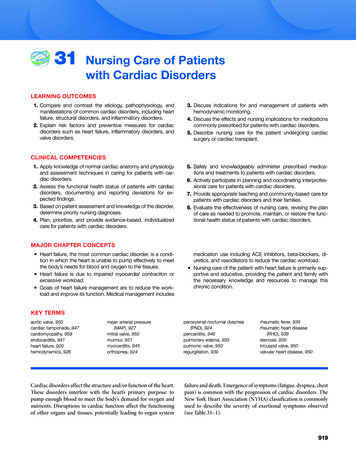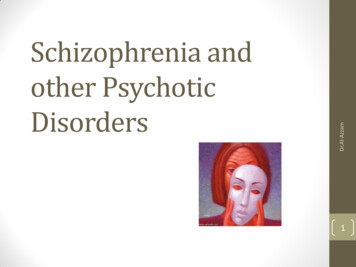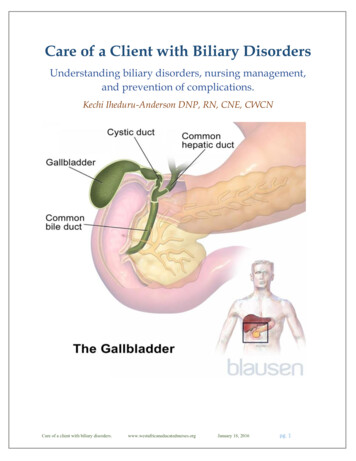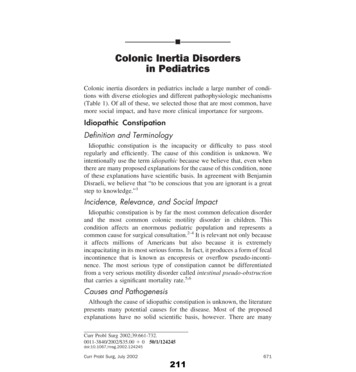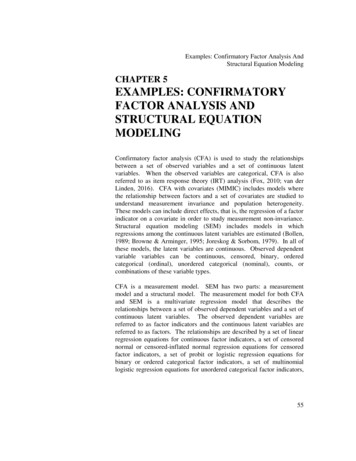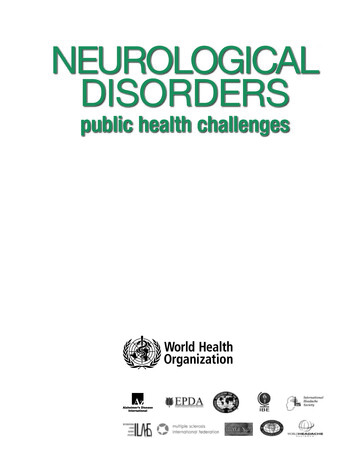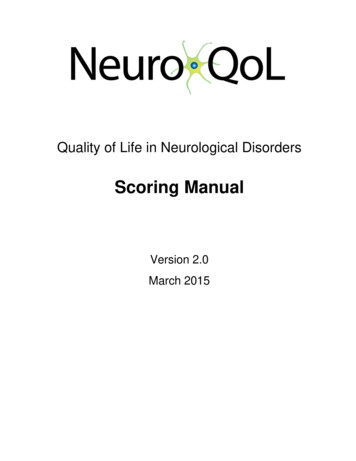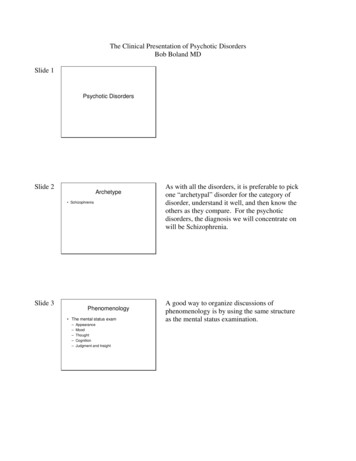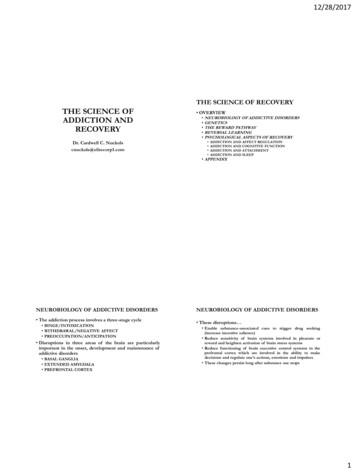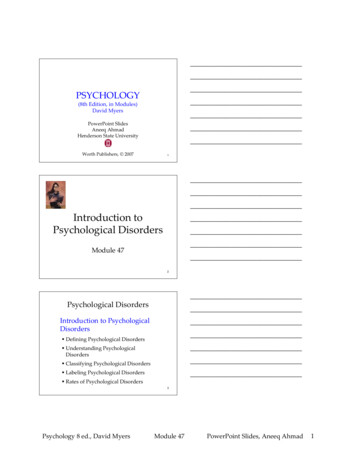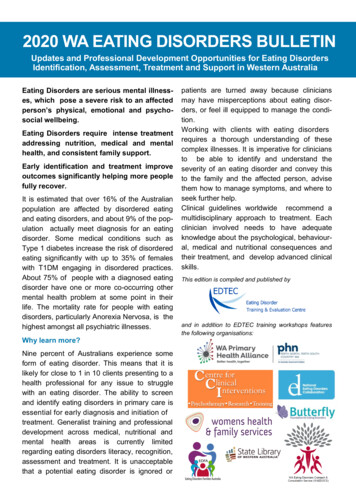
Transcription
2020 WA EATING DISORDERS BULLETINUpdates and Professional Development Opportunities for Eating DisordersIdentification, Assessment, Treatment and Support in Western AustraliaEating Disorders are serious mental illnesses, which pose a severe risk to an affectedperson’s physical, emotional and psychosocial wellbeing.Eating Disorders require intense treatmentaddressing nutrition, medical and mentalhealth, and consistent family support.Early identification and treatment improveoutcomes significantly helping more peoplefully recover.It is estimated that over 16% of the Australianpopulation are affected by disordered eatingand eating disorders, and about 9% of the population actually meet diagnosis for an eatingdisorder. Some medical conditions such asType 1 diabetes increase the risk of disorderedeating significantly with up to 35% of femaleswith T1DM engaging in disordered practices.About 75% of people with a diagnosed eatingdisorder have one or more co-occurring othermental health problem at some point in theirlife. The mortality rate for people with eatingdisorders, particularly Anorexia Nervosa, is thehighest amongst all psychiatric illnesses.Why learn more?Nine percent of Australians experience someform of eating disorder. This means that it islikely for close to 1 in 10 clients presenting to ahealth professional for any issue to strugglewith an eating disorder. The ability to screenand identify eating disorders in primary care isessential for early diagnosis and initiation oftreatment. Generalist training and professionaldevelopment across medical, nutritional andmental health areas is currently limitedregarding eating disorders literacy, recognition,assessment and treatment. It is unacceptablethat a potential eating disorder is ignored orpatients are turned away because cliniciansmay have misperceptions about eating disorders, or feel ill equipped to manage the condition.Working with clients with eating disordersrequires a thorough understanding of thesecomplex illnesses. It is imperative for cliniciansto be able to identify and understand theseverity of an eating disorder and convey thisto the family and the affected person, advisethem how to manage symptoms, and where toseek further help.Clinical guidelines worldwide recommend amultidisciplinary approach to treatment. Eachclinician involved needs to have adequateknowledge about the psychological, behavioural, medical and nutritional consequences andtheir treatment, and develop advanced clinicalskills.This edition is compiled and published byand in addition to EDTEC training workshops featuresthe following organisations:
ONLINE PROFESSIONAL DEVELOPMENT AND RESOURCES“HealthPathways WA is a free web-based portal with information on referral and management pathwayshelping clinicians to navigate patients through the complex primary, community and acute health care system in Western Australia. HealthPathways WA is a secure portal designed to be used at the point of careby general practitioners during consultation.The eating disorder pathways on HealthPathways include; eating disorders, anorexia nervosa, binge eating disorder, bulimia nervosa, pica, and eating disorders service information.To access HealthPathways please email the HealthPathways team.Free modules or sOnline learning accessible with payment or /www.aedweb.org/resources/webinarsVideos addressing specific topics:NEDC Eating Disorders ExplainedWSLHD – “Spot the Red Flags” Screening in primary careChristopher Fairburn on CBT-EAn Update on Family Based Treatment for Adolescent Eating Disorders with James Lock (AED webinar)Printable resources:NEDC Resource for GPsNEDC-Resource-PharmacistsDentistry and Eating DisordersPregnancy: A Guide for Assessment and ReferralNEDC Factsheets
E BOOKS AVAILABLE FOR FREE AT THE WA STATE LIBRARYThe State Library of WA has a large collection of ebooks available to the public.How to join for free:Fill out the online form - http://catalogue.slwa.wa.gov.au/selfreg S2 You'll receive an email from the State Library. You'll need to provide evidence that you are a resident of Western Australia. Identification showingyour residential address needs be faxed or scanned and emailed.Allow 5 working days for a membership card to be sent to you. With the membership number, you canthen login to access ebooks - ks infoIf you have any problems with registration, please contact the State Library (t. 9427 3111 ore. info@slwa.wa.gov.au)Examples of books available:
EATING DISORDERS TRAINING AND EVALUATION CENTREEDTECWho we areThe Eating Disorders Training and EvaluationCentre (EDTEC) was established in 2007 aspart of the Eating Disorders Service (EDS) atPrincess Margaret Hospital, Psychological Medicine. It is now located at Perth Children’s Hospitaland comes under the umbrella of the Child andAdolescent Mental Health Service. EDTEC integrates research, translates research into clinicalpractice within the area of child and adolescenteating disorders, and provides training workshops, consultation and supervision with a focuson eating disorders in young people, but beingapplicable across the life span.Prior to the establishment of the WA Eating Disorders Outreach and Consultation Service WAEDOCS in 2016, it was the sole training organisation providing education, consultation and supervision to practitioners and health services in thestate. EDTEC has an established annual trainingcalendar regularly run since 2008, which is accessible to professionals within WA Health as well asprivate practice. Training modules are annuallyreviewed and updated to most recent researchand evidence, and supported by the PCH EDSconsumer advisory group and carer and consumer peer support workers.What we offerEDTEC delivers workshops on a variety of relevant topics to professionals from a wide range ofbackgrounds such as mental health clinicians,medical practitioners, allied health professionals,nurses, school nurses and school psychologists,teachers, counsellors and therapists. EDTEC alsocollaborates with other professional groups andnon-profit organisations in organising workshopswith internationally renowned researchers andspeakers in the field of eating disorders witheither professional interest or community focus.Supervision and consultation options are available via phone, videoconferencing, face to faceconsultation and professional peer support, provision of resources for clinical managementsuch as General Practitioner resources, as wellas supporting non-specialist hospital serviceswith staff skills development and consultation onestablishment of clinical pathways and protocols.All our workshops are facilitated by experiencedclinical multidisciplinary staff of the Eating DisordersService.Some workshops may be available via VC link andusing Scopia or Telecall for rural/remote clinicians.Please contact us for information.General PractitionersGeneral Practitioners play a vital role in the diagnosis and treatment of patients with eating disordersas they are often a patient’s first point of contactwhen seeking help for an eating disorder and are agateway to other health services. Therefore it isextremely important that GPs are aware andknowledgeable of the psychological and medicalaspects of the disorders. Our training workshopsare tailored for a multidisciplinary audience including medical practitioners. We also provide a specificGP training workshop via the YFD training throughthe AMA. Contact yfd@amawa.com.au for details.Additional workshops are available to GP networksand practices on request, and resources for clinicalmanagement are also available free of charge.SchoolsWe provide professional development sessions toschools and youth organisations, and can provideconsultation and resources for eating disordersprevention and early intervention.For student and parent directed sessions, we canrefer you to the Butterfly Foundation WA representative.Training RequestsIf you require training for your organisation,please contact us to discuss your training needs.If you are a public or community service, we provide workshops at low or no cost during officehours at your workplace to groups of 6 ormore participants. Evening events can also bearranged. Videoconferencing may be available.Please contact us for more details or to book specific training sessions for your workplace:Contact EDTEC
EDTEC TRAINING INFORMATIONThe content of all our workshops mapped against the National Eating Disorders Collaboration (NEDC)Workforce core competencies for the safe and effective identification of and response to eating disorders.Competency areas:1. General knowledge of the clinical features of eating disorders, common treatments and the individualexperience of recovery2. Ability to identify warning signs of eating disorders and disordered eating and to conduct initial assessment within the scope of usual professional role3. Ability to engage the person with an eating disorder and family in a non-judgemental manner and tomotivate engagement with relevant health services and treatments4. Ability to support the person and their family to facilitate personal recovery5. Ability to contribute to multi-disciplinary team assessment, care planning and treatment within scope ofusual professional role6. Knowledge of current clinical practices and standards in the treatment of eating disorders7. Ability to deliver an evidence-based treatment for eating disordersFor more information and specific units of competency contained in the NEDC and ANZAED competencyFramework, go Applicable NSQHS Standards compliant
2020 Calendar of EDTEC Professional EventsPROFESSIONAL PEER SUPERVISION GROUPFree of chargeFirst Monday of each month, 4.30-6pm alternating withRegistrations essential, please email forFirst Thursday of the month 8-9.30amINTRODUCTION TO EATING DISORDERS:a registration form. 95 for each workshop dayDay 1- IDENTIFICATION AND ASSESSMENTDay 2- MANAGEMENT STRATEGIES14th - 15th May 2020, 9am-4pm (Thursday/Friday)21st - 22nd September 2020, 9am-4pm (Monday/Tuesday)Book below:Identification and AssessmentManagement StrategiesDIETITIAN BASICS WORKSHOP 95Wednesday 22nd April 2020, 9am-4pmthMonday 26 October 2020, 9am-4pmDIETITIAN ADVANCED WORKSHOPThursday 23rd April 2020, 9am-4pmTuesday 27th October 2020, 9am-4pmFAMILY INTERVENTIONS FOR EATING DISORDERSThursday 23rd July 2020, 9am-4pmBook here 95Book here 95Book here 60EARLY INTERVENTION FOR SCHOOLSRECOGNISING ISSUES AND INITIATING INTERVENTIONThursday 5th November 2020, 1.30- 5pmBook here
Eating Disorders Professional Peer SupervisionWhy get involved?Working with clients with eating disorders is complex, and requires clinicians to comprehensively engagewith clients, families and other professionals involved in their care, an manage crisis situations anddynamics can be demanding for all involved. Significant knowledge and skills beyond individual professional training are necessary, which are enhanced by experience and reflection on professional practice.Studies have also shown that health care professionals may experience significant feelings of anger, helplessness, anxiety, over-involvement and stress, potentially leading to physical and emotional exhaustion,and burnout. These responses can be collectively classified as countertransference, which is inevitableand needs to be reflected on and managed. Generally, it is recommended that health professionals undertake clinical supervision as part of their work. Peer supervision can act as a useful tool to facilitate learningfrom each other across disciplines, and be a platform to discuss common themes such as countertransference issues, and consider professional and personal boundaries within one’s work. A solid understandingof different roles and treatment methods also ensures professionals can be on the same page in supporting people towards recovery. These factors all contribute to professional peer group supervision forumsbeing an ideal mechanism to support professionals to deliver the best possible care whilst developing theirprofessional knowledge, skills and support networks.Groups will be facilitated by mental health and allied health staff of the Eating Disorders Program, CAHS,CAMHS, who have professional experience with eating disorders in diverse settings.Professionals working in both child/adolescent and youth/adult settings, across private practices and public services are welcome. Participation is free. The group will be a safe and confidential space to discusscases, gain experience, develop new skills and build relationships.Meetings are held in the centrally located Perth Children’s Hospital on level 2 in Clinic K.Videoconferencing is available for clinicians in rural/remote and areas outside of Perth metro. Please giveat least a week notice if you wish to attend via VC.The majority of people experiencing eating disorders obtain treatment and support within community settings. The EDP team are committed to supporting health professionals in Western Australia to provide thebest possible care to individuals with an eating disorder and their families.For a registration form, please contact EDTEC
INTRODUCTION TO EATING DISORDERS: IDENTIFICATION AND ASSESSMENTThis multidisciplinary workshop is designed as an introduction to understanding, identifying and assessingeating disorders across the life stages. The personal and family experience of eating disorders will beexplored from a lived experience perspective. Information will be presented on epidemiology, phenomenology, diagnosis, life course, risk and causal factors. This session includes information on screening,engagement and comprehensive assessment. Details will be provided on specialist services available inWA.Objectives:By the end of this workshop, you will be able to describe the clinical features of eating disorders, and the individual and family journey to recoveryfrom a lived experience perspective identify warning signs of eating disorders and disordered eating, apply a variety of screening tools,and describe multidisciplinary aspects of initial assessment with a focus on psychometric assessment tools engage clients with an eating disorder and their families in a non-judgemental manner and tomotivate engagement with relevant health services and treatments identify the level of severity of an eating disorder which requires specialist intervention list referral options in Western AustraliaVenue : Perth Children’s Hospital, QEII Medical Centre, Nedlands Book hereINTRODUCTION TO EATING DISORDERS: MANAGEMENT STRATEGIESThis multidisciplinary workshop will explore treatment strategies for eating disorders. Emphasis will be onrecognising presentations of eating disorders according to diagnosis, age, circumstances, history and motivation for change, and planning appropriate evidence based treatment incorporating multidisciplinarytreatment aspects. Psychological, medical and nutritional treatment are highlighted using case studies. Wewill also explore the core therapeutic stance and the skills required to function as an individual clinicianand as part of a team.Objectives:By the end of this workshop, you will be able to describe common evidence based treatments in detail as applied to various presentations includingwith particular focus on CBT, FBT, and motivational strategies outline strategies to support a person with an eating disorder and their family to facilitate recovery describe steps and details for multi-disciplinary team care plans and treatments considering appropriate care settings and risk aspects such as refeeding syndrome Identify current clinical practices and standards in the treatment of eating disordersVenue: Perth Children’s Hospital, QEII Medical Centre, NedlandsBook here
DIETITIAN WORKSHOP BASICSThis workshop is designed as an introduction to understanding, identifying and assessing, and managing eating disorders in dietetic practice. Participants will learn how to communicate effectively with clients in the context of potential ambivalence about engaging in treatment and denial of symptoms common in this group. Case based discussion will explore screening and comprehensive assessment of eating disorders. There will be a focus on nutritionaland medical risk issues of starvation and binge/purge behaviours, and their safe management.Objectives:By the end of this workshop, you will be able to outline the clinical features of eating disorders describe the use of screening tools consistent with evidence-based guidelines and identify at risk individualsand groups describe in detail dietetic assessment for eating disorders including a person’s dieting behaviours/ food choices and their background, meal preparation and set up, compensatory behaviours including excessive/compulsive exercise, disordered use of insulin and inappropriate use of other medications or supplements,measuring/weighing behaviours, and other aspects use data to identify the associated physical risks and psychiatric complications of ED behaviours, includingconsequences of under-nutrition, starvation and compensatory behaviours describe the management of malnutrition across varying levels of severity and the appropriate treatment setting (inpatient/outpatient) considering medical and psychological risk, refeeding syndrome, gastro-intestinalconcerns and nutritional requirements Identify professional and personal boundaries appropriate to one’s level of experience, work setting and ownpersonal triggers, describe ways to manage theseVenue: Perth Children’s Hospital, QEII Medical Centre, NedlandsBook hereDIETITIAN WORKSHOP ADVANCED LEVELThis workshop focuses on therapeutic approaches particularly useful in nutrition counselling for clients with eatingdisorders. Skills from various therapeutic approaches including CBT, motivational interviewing, and mindfulness, aswell as assisting families in supporting a loved one with eating including aspects of FBT/FT-AN treatment and mealsupport will be explored.Objectives:By the end of this workshop, you will be able to describe common evidence based psychological treatments in detail as applied to various presentations withparticular focus on CBT and FBT, and discuss the dietitian’s role as part of a multidisciplinary team in thosetreatments Outline and demonstrate the techniques used in motivational interviewing Describe and apply the steps using a CBT formulation and various CBT techniques in a dietetic counsellingsession Outline aspects of family-led refeeding, and the dietitian’s role in providing advice and coaching to families inmeal support Describe various ways in which mindfulness can be useful in supporting a person with an eating disorder tomanage eating and experience their body in a more positive wayVenue: Perth Children’s Hospital, QEII Medical Centre, NedlandsBook here
FAMILY INTERVENTION FOR EATING DISORDERSThere is a clear place for family therapy in the treatment of eating disorders. Eating disorder family therapy (FBT; ANFT, sometimes known as the ‘Maudsley’ approach) has emerged as the strongest evidence basedtreatment for adolescent anorexia nervosa, and there is increasing evidence of its efficacy in treating adolescent bulimia nervosa. Evidence is also accumulating for the efficacy of multifamily therapy formats, inwhich several families with a child with an eating disorder come together for intensive group treatment. Researchis also starting to identify “what works for whom” in terms of moderators and mediators of successful family basedtreatment, which can assist to refine and individualise the implementation of famil
Christopher Fairburn on CBT-E An Update on Family Based Treatment for Adolescent Eating Disorders with James Lock (AED webinar) Printable resources: NEDC Resource for GPs NEDC-Resource-Pharmacists


